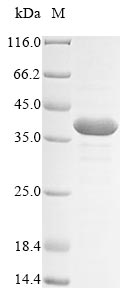This recombinant Mouse Ascl2 protein is typically achieved by the manipulation of Ascl2 gene expression in E.coli cells so that it expresses large amounts of a recombinant Ascl2 gene. In order to get enough amount of the Ascl2 protein, strain selection, codon optimization, fusion systems, co-expression, mutagenesis, and isotope labeling techniques are used. Finally, the Ascl2 protein is isolated from the samples such as cell lysates or medium. Protein refolding, cleavage of fusion moieties and chromatography techniques are involved in the protein purification process.
Ascl2, a basic helix-loop-helix (bHLH) transcription factor, is required for diploid multipotent trophoblast progenitors, intestinal stem cells, follicular T-helper cells, as well as during epidermal development and myogenesis. It is expressed in neuronal precursors. Ascl2 is a downstream target of the Wnt signaling pathway and also a cancer stem cell marker. Ascl2 has been reported to promote cell proliferation and migration in colon cancer and contribute to epithelial-mesenchymal transition (EMT) and promote metastasis in gastric cancer (GC).






